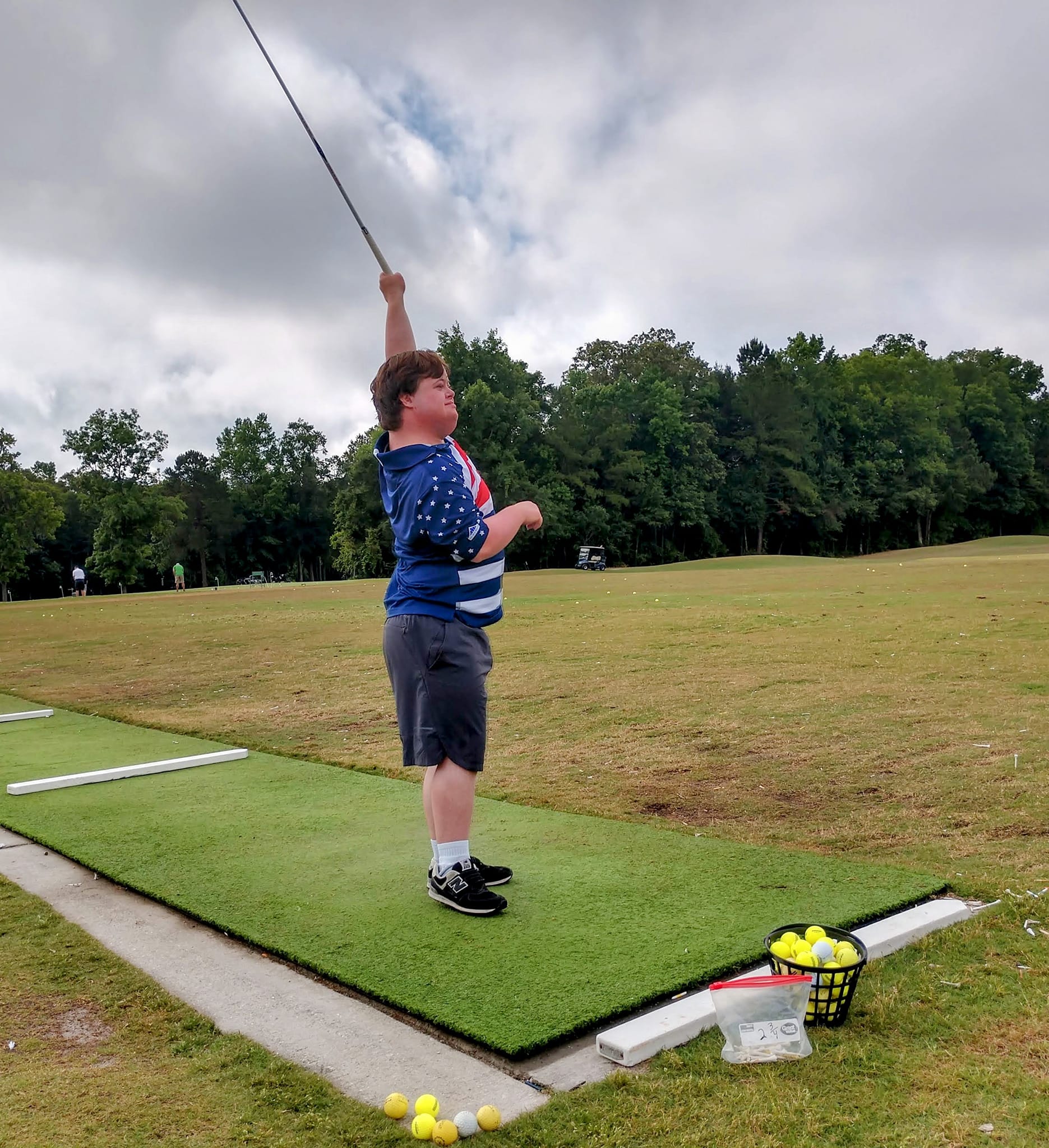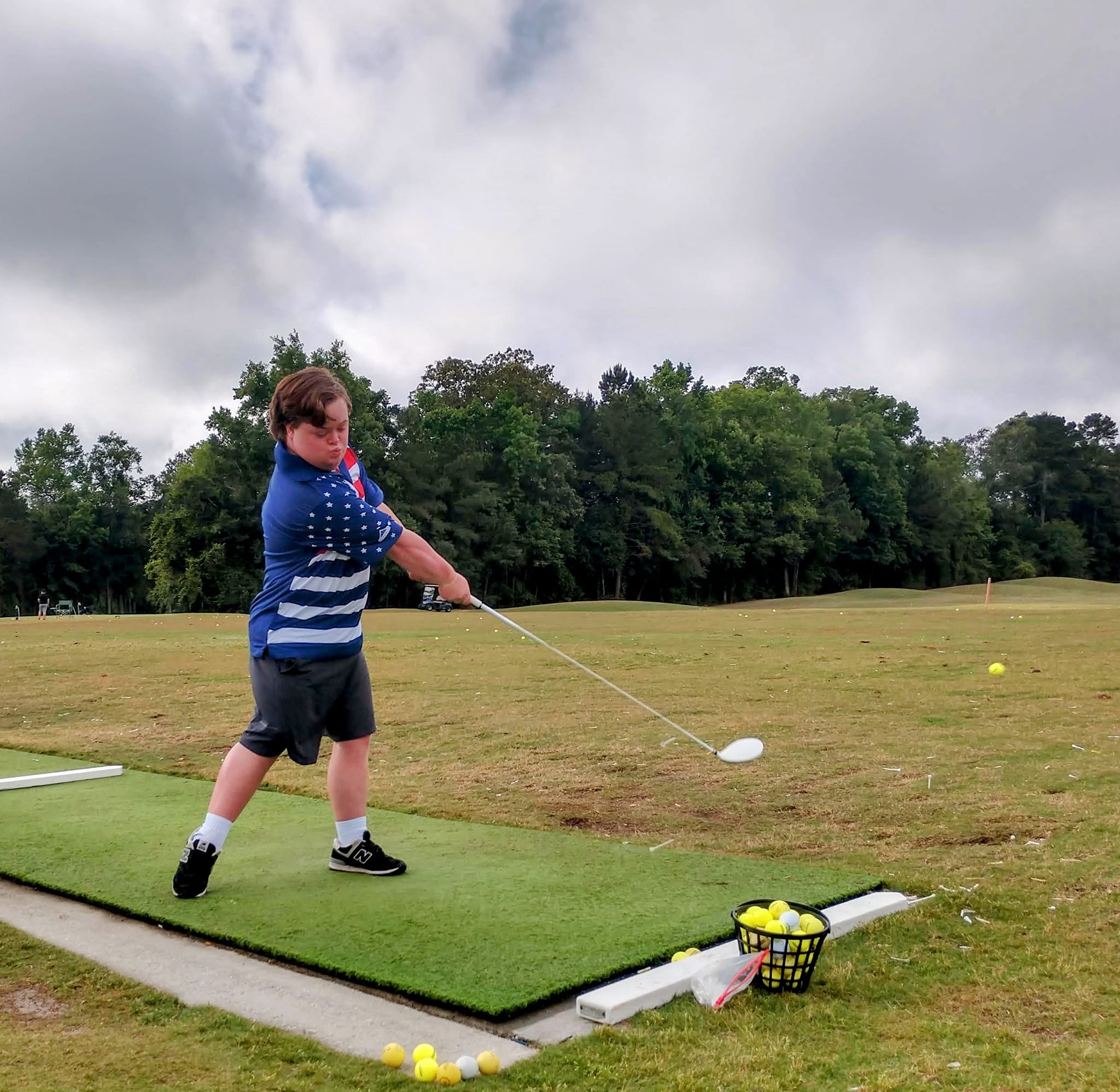Golfer Spotlight with Rich O'Brien
Henry O'Grady Plays Golf With an Infectious Joy That Inspires Everyone
By Rich O’Brien
Henry O’Grady has beaten the odds his whole life. You see, he was born with Down Syndrome and a Congenital Heart Defect. At the age of 2, he was rushed to the hospital with a life-threatening illness that was diagnosed as bacterial pneumonia which required a five-week stay in the ICU. Then at age six, he was diagnosed with Autism. For most of his life, Henry has had to take heart and lung medication to treat his heart defect and asthma.
Henry first started hitting golf balls at the age of five under the watchful eye of his grandfather, Clarence Winningham, a Navy Veteran. From the beginning, Henry used a split grip much like a hockey player and has used his exceptional hand-eye coordination to hit the ball a long way despite his small stature.
At the age of eight years old, Henry joined the Dorchester Dragons Special Olympics program and became one of the youngest golf participants ever in the Lowcountry. Seven years later, he was ready for Level 2 and won three consecutive gold medals from 2017-2019 pairing with Paul Van Zutphen in 2017 and 2018 and Brian Stefan in 2019. One of Henry’s long-term goals is to represent the State of South Carolina in the USA Games. Back in 2018, the dream almost came true when Henry and Paul Van Zutphen were the first alternates to represent South Carolina in the USA Special Olympics Games in Seattle Washington. Henry’s Special Olympics coach, T.J. Trimeloni is hopeful that he will be selected for a future USA Special Olympics Games.
While Henry was competing in the Special Olympics Program he also started simultaneously participating in the First Tee of Greater Charleston in 2015 and continued through 2020. When the The First Tee coaches first saw Henry’s swing they were absolutely amazed as Coach Frank Moore gave him the nickname “The Machine” and Coach Wayne Nance reacted by saying: “Are you kidding me!!!” Unlike in the school systems where special needs kids, like Henry, are usually segregated from the rest of the school, through the local First Tee Program, over time, Henry became a leader among the kids in the program as he learned socialization skills, how to behave, and take turns in golf. The other kids in the program began looking for leadership from Henry and this greatly helped him gain both confidence and maturity. There is truly something special about the game of golf when unique abilities are revealed and embraced by the community.
During that time period, Henry would have a golf club in his hand for four days a week as his busy golf schedule included First Tee on Tuesdays at Patriot’s Point, Special Olympics on Thursdays at Wescott, a trip to Frankie's Driving Range on Saturdays, and playing golf at Charleston Municipal on Sundays with Paul Van Zutphen.
Then in April of 2018, Henry was introduced to the sport of long drive when an Amateur Long Drive (ALD) qualifier was being held at Patriots Point. At the event, Henry hit a drive of 201 yards to qualify for the ALD World Championship Adaptive Division in Myrtle Beach later that summer where Henry was crowned the world champion in the Downs Syndrome category. Since 2018, Henry regularly competes in ALD qualifiers in the Coastal Carolina league and has become one of the most popular hitters among his fellow competitors and the fans. Over the past five years, Henry has won one national championship and six World Championship titles (4 ALD and 2 ParaLong Drive) in the Adaptive Division. To date, his longest drive in competition was measured at 239 yards in Mesquite, Nevada in the 2019 ParaLong Drive World Championship. This fall, Henry is scheduled to compete during the third week of September up in Myrtle Beach for the ALD National Championship and hopes to again qualify for the 2022 World Championship which will be held later this year in Lakewood Ranch, FL.
In July of 2021, I began a pilot golf therapy program through the Stand Up and Play Foundation called the HERO Golf Therapy Program. HERO is an acronym for Helping Emergency Responders Overcome and in addition to emergency responders and their families, individuals from the community with injuries, illnesses, or challenges, are welcome to attend the FREE clinics. When Henry was invited to participate and accepted by the emergency responders it brought tears to Henry’s mom’s eyes!
 Golf has been a tremendous blessing for Henry. The game can be extremely challenging both mentally and physically, but his golf skills gradually developed through consistent hard work and dedication. Henry is happiest when he is on the golf course smashing a golf ball. If he hits an exceptional shot, he points his club straight up to the sky. For Henry, the golf course levels the playing field and no one sees his disability as he is judged by his peers based on his golf ability.
Golf has been a tremendous blessing for Henry. The game can be extremely challenging both mentally and physically, but his golf skills gradually developed through consistent hard work and dedication. Henry is happiest when he is on the golf course smashing a golf ball. If he hits an exceptional shot, he points his club straight up to the sky. For Henry, the golf course levels the playing field and no one sees his disability as he is judged by his peers based on his golf ability.
Another benefit of golf has been that Henry’s health has improved considerably over the years which allowed him to be weaned off all of his previous heart meds in 2018 and now he only takes lung meds to control his asthma.
Henry O’Grady has certainly beaten the odds. Golf has allowed him to compete in local, state, regional, national, and world championship golf events throughout the United States. It has helped him to meet people from all walks of life who have become friends and fans. The game has allowed him to gain maturity and assume leadership roles among his peers.
Henry has faced many challenges in his young life and has learned to adapt and overcome many of them. He plays golf with such infectious joy that he inspires everyone. I look forward to watching this special young man continue to take on the world vying for more world championships.

**********************
About the Author
Rich O’Brien is a member of the Board of Directors for the National Alliance for Accessible Golf. Rich is a golf writer who tells the stories of golfers who use golf as therapy to recover from their injuries, illnesses, or challenges. Rich survived a complex polytrauma that included a broken back, a broken neck, four skull fractures, and brain damage in every lobe of his brain. Golf therapy was a big part of his own recovery. Now he is an advocate for individuals with disabilities.
